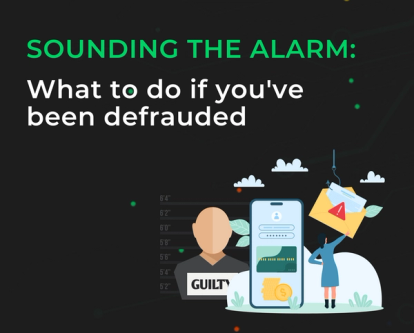Sounding the alarm: what to do if you've been defrauded

Fraud remains a prevalent theme in today’s economic landscape, with the rising cost of living acting as a catalyst for scammers to work harder at defrauding potential victims. In just the first quarter of 2023, over 40 million adults were targeted by scammers – more than half of the population. Phones, social media, dating apps; practically all popular platforms are leveraged by fraudsters to rob individuals of what they have.
With fraud on the rise, getting scammed is something that could happen to anyone, and while prevention is essential, ultimately, you need to know what you should do if the worst were to happen.
Acting quickly is essential. As a first action, you need to let your bank know what has happened, strengthen your personal security, and gather as much information about the scam as possible. A proper, prompt response doesn’t just protect you from the worst, it can help prevent the scammer from doing more harm in the future.
To help you be prepared, here’s our step-by-step guide on what you should do if you’re one of the millions of us that get scammed.
Let your financial institution know
If you notice suspicious activity or unfamiliar transactions in your accounts, don’t keep it to yourself. Immediately contact your bank and let them know what has happened. If a scammer has access to your accounts, it’s important to have them frozen immediately to prevent further unauthorised access.
This should be your first step, as limiting any further fraudulent activity is of paramount importance. Contact your bank’s customer service or fraud department to report the activity – this could be outbound transactions to unfamiliar parties or even unexplained debits to your account. If it doesn’t feel right, let your bank know right away.
You must also be mindful of how this activity was reported to you – if you spot unfamiliar activity within your banking app, contact the bank immediately, but be wary that scammers will sometimes pose as your bank and try to trick you into sharing your banking information and authorising push payments into their pockets.
Take records of the activity
Be prepared to document and monitor the facts of the fraud – take down all dates, times and amounts related to the fraud, no matter how insignificant. Having a clear record of what has happened will help when it is time to report the fraud to the authorities and may be relevant in any legal follow-up.
Be sure to share your records with your financial services provider, as this will create a clearer picture of the fraud and help them to prevent future fraudulent activity.
Strengthen your security
Whether or not you know how fraudsters may have gained access to your funds, it’s essential to resecure your accounts. Quickly reset your passwords, PIN and security questions using unique combinations that are impossible for others to guess, no matter how well they know you. You should also reset the passwords to your attached email accounts and consider reinstalling your banking apps.
Sharing passwords between accounts can compromise your financial security and can make it easier for scammers to access multiple accounts at once.
Having fallen victim to fraud, you are more vulnerable to repeated attempts in the future, making tighter security essential. What's more, being defrauded can lead to a ‘marker’ being placed on your account by CIFAS, a fraud prevention organisation, that can remain attached to your account for up to six years. This marker may make it difficult to secure mortgages and credit in the future. A rapid response to fraudulent activity is essential to avoid this, though there are steps that can be taken to remove markers.
Report the fraud to the authorities
If you’ve been the victim of financial crime, there is no sense in keeping it to yourself. Report the activity in as much detail as possible to the police and Action Fraud or call their helpline at 0300 123 2040. They will provide you with a Crime Reference Number (CRN), which may be required for future reference.
Being transparent about fraud, collecting as much information about the case as possible and doing everything in your power to prevent further activity are all essential to your fraud response. Acting quickly is the most important part – the sooner you report the incident and take measures to secure your accounts, the better your chances of minimising the impact on your finances and personal information.
Find out more about what to do if you’ve been defrauded here:





